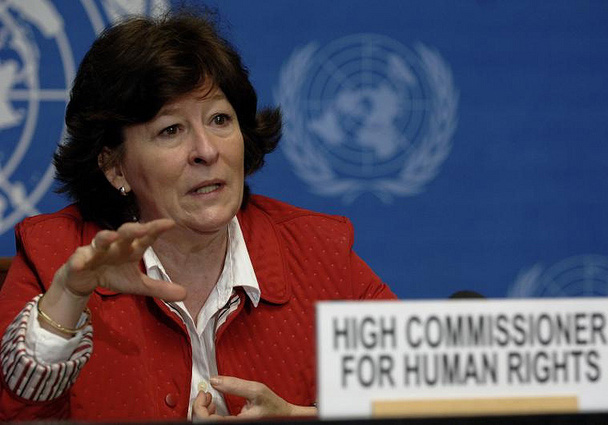The ICJ today called on states to provide the political and financial support necessary for the UN High Commissioner for Human Rights, Louise Arbour, to turn into reality her creative human rights vision for the Office of the High Commissioner for Human Rights (OHCHR).
The OHCHR Plan of Action: Protection and Empowerment, released by the UN Secretary-General on Friday, outlines a strong leadership role to be played by the OHCHR in protecting human rights and empowering people to claim their rights.
“In recent discussions about reform of the United Nations, most states have agreed that the High Commissioner’s office needs significantly more resources to be effective. Now they have an opportunity to act on their words,” said ICJ Secretary-General, Nicholas Howen. “We look to states to endorse the vision set out by the High Commissioner and to provide dramatically increased finances through the UN’s regular budget and through voluntary contributions.”
Although human rights is identified in the UN Charter as one of the UN’s four purposes, the OHCHR receives a mere 1.8 percent of the regular budget of the UN to protect and promote human rights in 191 UN Member States. The Plan of Action estimates that the OHCHR will need to double its budget over the next five to six years. The OHCHR will also need greater authority over its finances and recruitment.
“However, even before this plan is financed, there is much the High Commissioner can do to start addressing the shortcomings of the Office,” said Nicholas Howen. “As set out in the Plan, the OHCHR needs to bring in greater country expertise, deepen its engagement with governments, more effectively operate field presences and be able to respond rapidly to human rights crises. The Office especially needs to be able systematically to learn and act on lessons from past experiences,” he added.
The ICJ agrees with the High Commissioner that the rich achievements in developing international human rights standards and norms have been blunted by a failure to achieve real implementation. The High Commissioner rightly identifies impunity, lack of democracy, poverty and inequality, discrimination, armed conflict and violence, and weak institutions as among the chief challenges to be addressed “to close the gap between human rights rhetoric and reality.”
The ICJ has always maintained that respect for the rule of law and respect for human rights are inextricably linked. The High Commissioner has acknowledged this innate link in her report. She places a premium on improving in-house legal expertise, providing human rights legal advice, tackling impunity and working in countries for laws that respect international law and justice systems that are independent and effective.
Reform of the OHCHR is an integral part of reform of the UN human rights system. “As broad and deep as her mandate is, the High Commissioner rightly sees her role as an essential component of a much wider UN human rights program”, says Nicholas Howen. “It was therefore important that she underscored the need to reform and strengthen the other key elements of the UN human rights system, in particular the special procedures and treaty body system.”
The ICJ applauds the High Commissioner’s bold idea for reform of the treaty body system. While characterizing the system as “one of the Organization’s greatest achievements”, she insists that a means must be found to consolidate the work of the seven main treaty bodies to create a unified standing treaty body and to ensure a holistic approach and jurisprudential coherence.
“The OHCHR is increasingly called on to play a difficult but essential human rights leadership role in the field and in the broader United Nations system. It needs the political support and finances to fulfil this mandate,” added Nicholas Howen.




